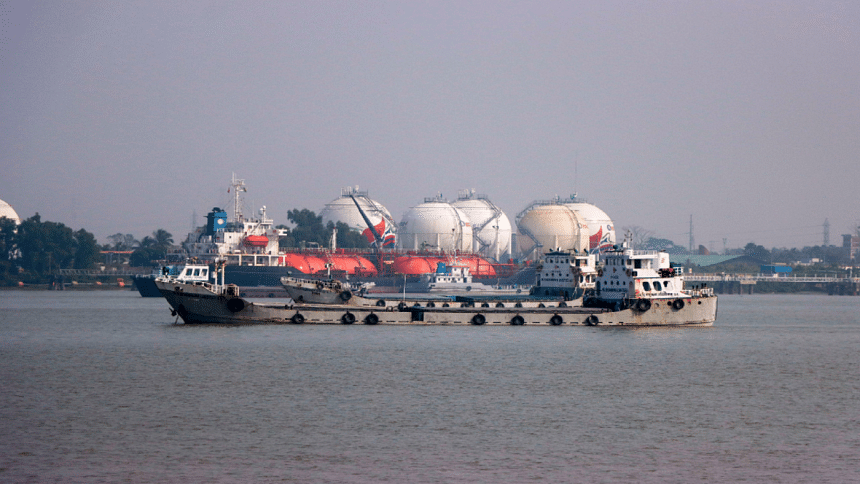Bangladesh ponders running industries on LPG

The government has formed a panel to frame a policy by identifying the potentials and challenges of use of liquefied petroleum gas (LPG) in the industrial sector.
A 14-member committee headed by Md Shameem Khan, director general, hydrocarbons unit, Energy and Mineral Resources Division, will draft the policy in two months, said Khan while talking to The Daily Star.
The Ministry of Power, Energy and Mineral Resources issued a notice in this regard on December 6.
The decision to form the committee was taken at a meeting on "Possibilities, Challenges, and Recommendations on LPG Use in Industry as an Alternative Fuel" held on November 7.
It was chaired by Dr Tawfiq-e-Elahi Chowdhury, the prime minister's adviser for energy, power and mineral resources.
The meeting identified some of the potentials and challenges and looked into comparisons of the technical and commercial aspects of LPG use with other fuels.
"We will discuss and hold dialogues with all stakeholders, including users and suppliers, to avail opinions before formulating the draft policy," he said.
Mills currently run on liquefied natural gas (LNG), whose primary component is methane, said Mohammad Ali Khokon, president of the Bangladesh Textiles Mills Association.
The primary component of LPG is propane for which it cannot be used to run the mills, he said.
There are a lot of questions regarding the shift from using methane to propane, he said, adding that they had shared their concerns in a meeting with Dr Tawfiq-e-Elahi Chowdhury.
In Bangladesh, many factories have been using LPG as an alternative to traditional captive power generation methods such as diesel generators, said Asif Ibrahim, a director of the Bangladesh Garment Manufacturers and Exporters Association.
However, LPG is considered to be a cleaner and more environmentally-friendly fuel compared to diesel and its use can help reduce air pollution and greenhouse gas emissions, he said.
Switching to LPG can also help reduce operating costs for factories as LPG is often more cost-effective than diesel, said Ibrahim, also managing director of textile manufacturer Keilock Newage Bangladesh Ltd.
Additionally, use of LPG can contribute to energy security as it will lead to the diversification of the types of energy used in industrial operations, he said.
However, making the switch will require factory owners to make a huge amount of investment, he said.
The government must provide cash incentives and tax breaks to factories that shift from captive power generation to LPG and adequate time must also be allowed, he noted.
It is important to note that while LPG offers several advantages over traditional fuels, its use still comes with its own set of considerations, such as safe handling and storage practices, said Ibrahim.
Additionally, the availability and infrastructure for LPG distribution and storage need to be adequately developed to support widespread adoption in industrial settings, he said.
The challenge to increasing LPG use in existing industrial units lies in its price difference with LNG, said Jakaria Jalal, executive director of Bashundhara LP Gas Ltd.
The company is the market leader, accounting for a 24 percent of the $3.2 billion LPG market in Bangladesh.
According to him, LPG is now priced at around Tk 103 per kilogramme (kg) while LNG is around Tk 40 per kg.
Industrialists will not be interested in making the shift from LNG to LPG, he said.
According to the minutes of the meeting held on November 7, a total of 30 multinational and domestic private companies, including franchisees, are bottling and marketing LPG in Bangladesh.
Currently, the country has an annual demand for about 14 lakh tonnes of LPG, which is increasing continuously. Once it runs out of natural gas reserves, this demand will increase exponentially, read the minutes.
At present, providing uninterrupted supply of LPG to meet the huge demand for household fuel of about 16.5 crore people in the country is a big challenge for the government.
With natural gas production decreasing day by day at government and private company-managed gas fields, and natural gas reserves running out, use of alternative sources of energy was suggested at the meeting.
The meeting also mentioned that emphasis needs to be laid on the use of LPG in industrial and commercial sectors apart from in domestic settings.
The meeting recommended calling upon the public and private sectors to come forward in overcoming the challenges by determining the prospects and challenges of LPG use.


 For all latest news, follow The Daily Star's Google News channel.
For all latest news, follow The Daily Star's Google News channel. 



Comments